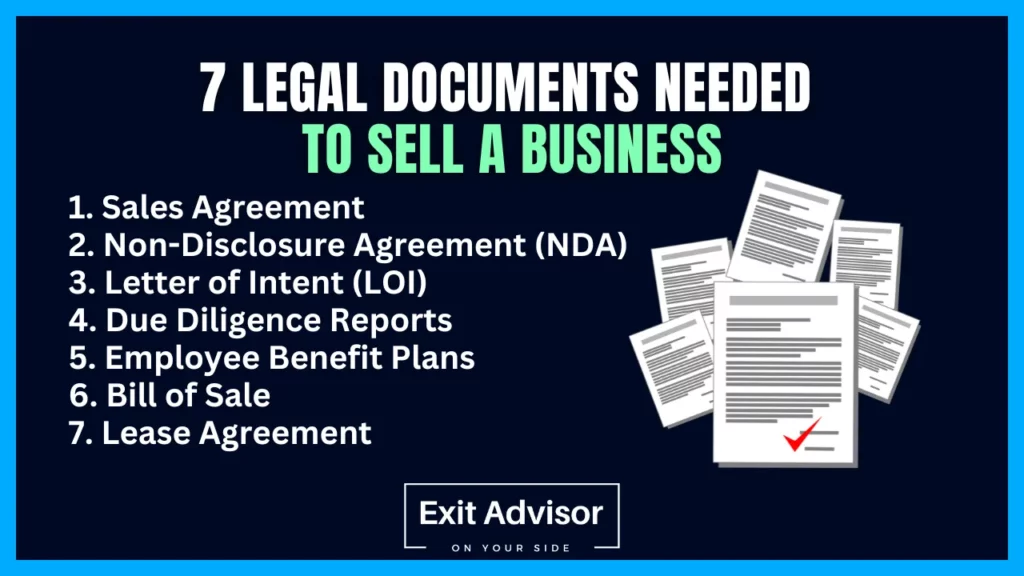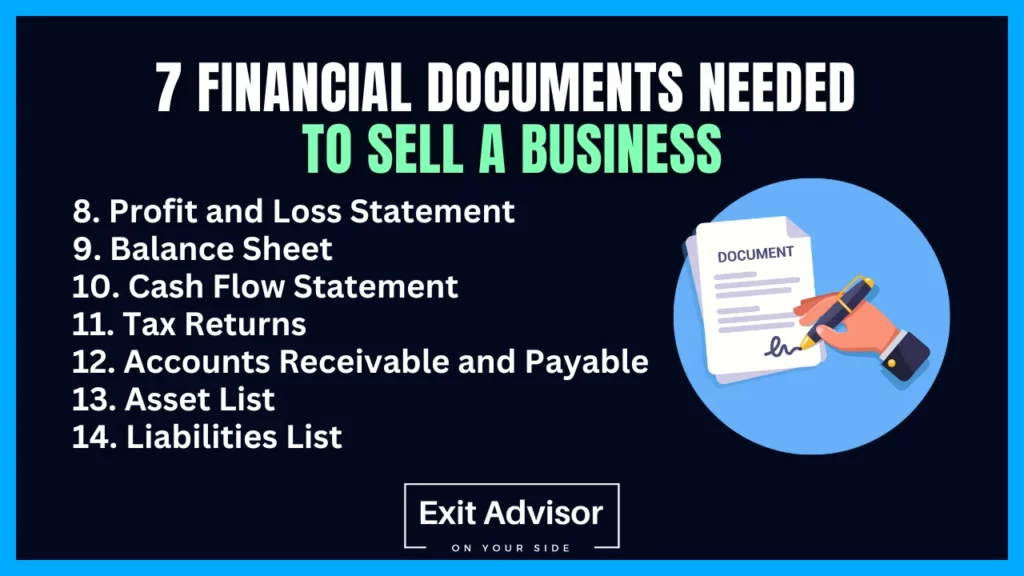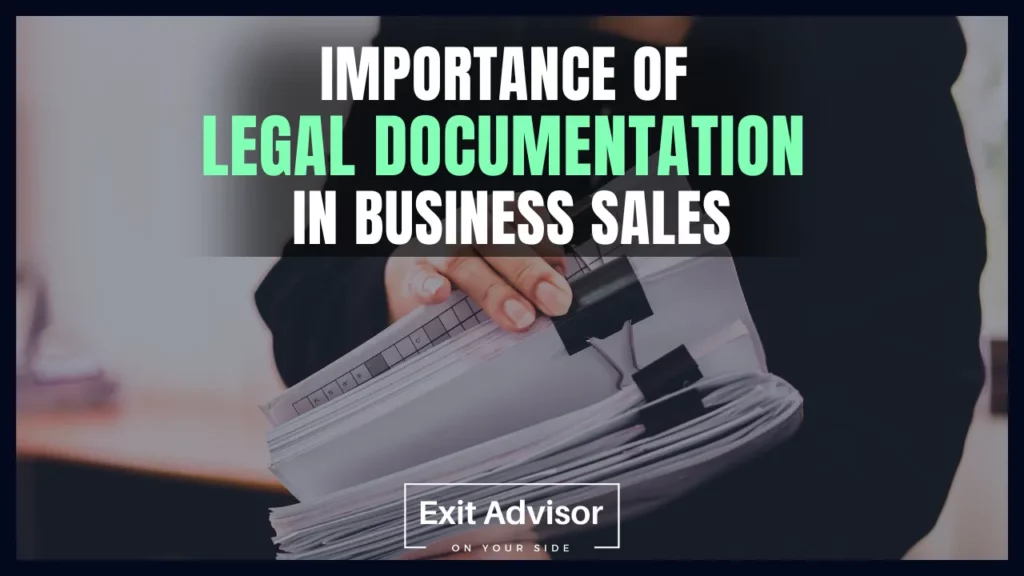Selling a business is no small feat. It involves intricate processes and many documents needed to ensure a smooth transition. Welcome to my comprehensive guide that explains the essential documents needed to sell a business. This blog post highlights the 14 critical documents needed to sell your business.
I'll walk you through legal documentation such as sales agreements, non-disclosure agreements (NDAs), letters of intent (LOIs), and due diligence reports. These documents protect the buyer and seller from potential liabilities, ensuring that every sale aspect is legally sound.
We'll also delve into financial records essential in the selling process. These include profit and loss statements, balance sheets, cash flow statements, and tax returns. Providing these financial documents to the prospective buyer may prove your business's financial health and help determine its worth.
Whether you're a small business owner preparing to sell your business or a potential buyer looking to understand the checklist of documents and information required for a business sale, this guide will serve as your roadmap.
I’ll help you navigate the often confusing and complex business selling journey, making it a more manageable task. So, let's get started and prepare to sell your business with confidence and ease.
| Type of Document | Specific Documents Needed |
| Legal Documents | 1. Sales Agreement 2. Non-Disclosure Agreement (NDA) 3. Letter of Intent (LOI) 4. Due Diligence Reports 5. Employee Benefit Plans 6. Bill of Sale 7. Lease Agreement |
| Financial Documents | 8. Profit and Loss Statement 9. Balance Sheet 10. Cash Flow Statement 11. Tax Returns 12. Accounts Receivable and Payable 13. Asset List 14. Liabilities List |
The Legal Documents Needed to Sell a Business

1. Sales Agreement:
The Sales Agreement is a crucial legal document that outlines the terms and conditions of the business sale. It includes the purchase price, payment methods, closing date, and any contingencies that should be fulfilled before the sale. It also dictates who will bear various costs, such as taxes, closing, and legal fees. This agreement ensures both parties understand and agree on the business transaction's specifics.
2. Non-Disclosure Agreement (NDA)
A Non-Disclosure Agreement is a protective document that safeguards sensitive business information. The potential buyer signs this agreement to not disclose or misuse any business information during and after the negotiation process. This agreement is crucial to prevent information leaks that could harm the business, even if the sale is not completed.
3. Letter of Intent (LOI)
The Letter of Intent is a non-binding document that signifies a serious commitment from the buyer to purchase the business. It outlines the main terms of the deal, such as the proposed price, payment method, and closing date. This document sets the stage for negotiations and formal agreements.
4. Due Diligence Reports
Due Diligence Reports are comprehensive evaluations the buyer conducts to confirm the business's value. These documents cover all aspects of the business, such as financial, legal, operational, and market position. They allow the buyer to understand the business's strengths, weaknesses, opportunities, and threats before the purchase.
5. Employee Benefit Plans:
The EBP document describes all employee benefits and compensation packages. A buyer must understand these existing obligations as they assume them after the purchase. They include health insurance, retirement plans, paid time off, and other benefits.
6. Bill of Sale:
The Bill of Sale is a legal document proving the ownership transfer from the seller to the buyer. It contains details such as the purchase price, the date of sale, and descriptions of the assets included in the sale. This document serves as a transaction record and is needed for tax purposes.
7. Lease Agreement:
The lease agreement is essential if the business includes rented intellectual property. It details the property lease terms, including rent amount, lease duration, and tenant and landlord responsibilities. The buyer must understand these terms as they will assume the lease after the purchase.
The Financial Documents Needed to Sell a Business

8. Profit and Loss Statement (P&L)
A Profit and Loss Statement or P&L is a financial document summarising revenues, costs, and expenses incurred during a specific period. This statement provides information about a company's ability to generate profit by increasing revenue, reducing costs, or both.
For potential buyers, a P&L statement is vital because it shows the business's profitability, which can indicate its future performance. It serves as a foundation for forecasting future profits and cash flow. This document is useful when selling a failing business.
9. Balance Sheet:
The Balance Sheet is a financial statement that reports a company's assets, liabilities, and shareholders' equity at a particular time. It provides a snapshot of what a company owns and owes and the amount shareholders invest.
The balance sheet is crucial for buyers because it provides a clear picture of the company's financial health, enabling a more informed decision about its value and potential risks.
10. Cash Flow Statement:
A Cash Flow Statement is a financial document showing how balance sheet accounts and income changes affect cash and cash equivalents. It breaks the analysis down into operating, investing, and financing activities.
For potential buyers, understanding a business's cash flow can reveal its liquidity position and the ability to cover liabilities, a crucial factor in assessing its sustainability and growth potential.
11. Tax Returns:
Tax Returns are official documents where a taxpayer makes a statement of income, personal circumstances, and tax liability. They provide a clear and credible record of a business's financial history.
Potential buyers need to review these documents to understand any outstanding tax obligations and to verify the accuracy of the income reported in other financial documents.
12. Accounts Receivable and Payable:
Accounts Receivable and Payable represent the money customers or suppliers owe. The Accounts Receivable indicates the business's efficiency in collecting customer payments, while Accounts Payable demonstrates its ability to pay off short-term obligations.
Potential buyers examine these accounts to evaluate the business's liquidity and credit management, which can impact the company's cash flow.
13. Asset List:
An Asset List is a comprehensive list of all the business's tangible and intangible assets. This may include physical assets like buildings, equipment, inventory, and intangible assets like patents, trademarks, and customer relationships. Potential buyers will scrutinize the asset list to understand the value of the resources they acquire, directly affecting the business's selling price.
14. Liabilities List:
The Liabilities List records all debts a business owes. This could include loans, mortgages, accounts payable, and accrued expenses. The liabilities list is significant for potential buyers because it informs them of the obligations they would inherit upon purchasing the business. It helps buyers evaluate and consider the risk involved in their business valuation.
Importance of Legal Documentation in Business Sales

Maintaining Legal Compliance
The importance of documentation in business sales cannot be overstated. Ensuring that every transaction complies with local, state, and federal laws is crucial.
Legal and financial documents outline the deal's parameters and clearly understand the business's operational, financial, and legal status. This due diligence helps protect the seller and the buyer from future disputes and legal repercussions. Legal documents are important when selling a business to a competitor. Check my guide on how to sell a business to your competitor.
Transaction Transparency
Legal documentation provides comprehensive sales details, including the agreed prices, terms, conditions, and warranties. These documents offer transparency, ensuring all parties are fully informed about every aspect of the transaction. This transparency is essential in promoting trust between the buyer and the seller, providing a smooth transition during the change of ownership.
Ensuring Agreement Binding
Legal documents, such as the Purchase Agreement or Letter of Intent, serve as formal expressions of commitment to the transaction. They create a binding agreement between the buyer and the seller, outlining the responsibilities of each party. This binding nature ensures that all parties fulfill their commitments, providing a legal recourse if one party fails to meet its obligations.
Establishing Clear Ownership Transfer
Legal documents confirm the transfer of ownership and the terms under which it occurs. The Bill of Sale, for instance, is a document proving the ownership transfer from the seller to the buyer. These documents prevent future disputes over ownership and provide a clear transaction record for tax and business purposes.
Safeguarding Confidential Information
During a business sale, sensitive information is often shared between parties. Non-disclosure agreements protect proprietary information, ensuring that sensitive information isn't disclosed to third parties or used inappropriately. Thus, legal documentation is critical in preserving the confidentiality of the business’s operations, financials, and strategies.
Who Drafts Documents Required For Selling a Business?
Attorneys or other legal professionals typically draft the legal documents required for selling a business. These individuals have the knowledge and expertise to ensure that the documents accurately reflect the terms of the sale of your business and comply with all laws and regulations.
In some cases, business brokers may also assist in drafting these documents, especially if they specialize in mergers and acquisitions. However, an attorney reviewing the documents is still recommended to ensure their legality and accuracy.
Engaging legal professionals when selling a business is essential to minimize potential risks and protect both parties' interests. Their expertise ensures that all necessary documents are prepared, reviewed, and executed correctly, providing a smooth transaction for all parties involved.
So, hiring a qualified attorney or legal team is highly recommended when selling a business. Legal documentation is essential in any business sale and should be considered. It is crucial to have all necessary documents properly drafted and executed to ensure a successful and legally compliant transaction.
The Role of These Documents in the Selling Process
Legal documents are crucial in ensuring a successful and legally compliant business sale. These documents serve as evidence of the agreed terms and conditions between the buyer and the seller and protect both parties.
Moreover, these documents also help maintain transaction transparency, safeguard confidential information, establish ownership transfer, and ensure agreement binding. They also aid in maintaining legal compliance and avoiding future disputes or legal repercussions.
The business sale can become complicated and risky for both parties without proper legal documentation. These documents provide a solid foundation for the transaction and help mitigate potential risks, ensuring a smooth transfer of ownership.
What Does the Due Diligence Stage Involve?
The due diligence stage is an essential part of the business sale process, and it involves a thorough investigation of all aspects of the business. This stage typically occurs before the legal documentation is drafted, and its purpose is to gather information about the business's operations, finances, and legal status.
Both parties conduct due diligence during this stage to ensure all relevant information is disclosed and understood. The buyer will review the business's financials, operations, contracts, and other relevant documents to assess its value and potential risks.
On the other hand, the seller may also conduct their due diligence on the buyer, such as reviewing their financial capability to purchase the business and their intentions for its future operation.
The due diligence stage is crucial in identifying potential issues or concerns affecting the sale. It allows both parties to make informed decisions and negotiate any necessary changes before finalizing the legal documents.
Conclusion
Legal documentation ensures a successful and legally compliant business sale. These documents protect both parties, establish clear ownership transfers, maintain transaction transparency, and safeguard sensitive information.
It is essential to have a legal accountant involved in the drafting and review process to ensure accuracy, legality, and fairness for both parties.
Moreover, conducting due diligence is crucial before finalizing the documents to mitigate any potential risks and ensure a smooth transaction.
Therefore, it is imperative to prioritize documentation in the business sale process to avoid future disputes or legal repercussions and facilitate a successful transfer of ownership.
So, take the necessary steps to protect your interests as a buyer or seller and safeguard the future of your business with proper legal documentation.
Remember, the success of a business sale is not just about finding the right buyer or seller but also about ensuring a legally compliant and secure transaction with the help of legal professionals. So, be proactive and prioritize legal documentation in your business sale for a positive outcome.










